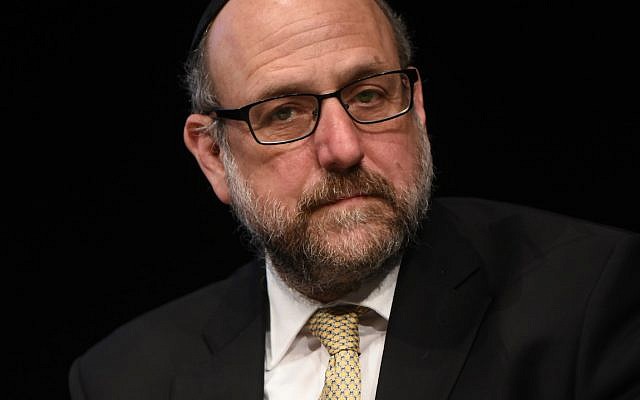Poland’s chief rabbi: Jews here have gone from receiving to giving
Rabbi Michael Schudrich says the country's community has changed in the face of Russian aggression in Ukraine and the resulting refugee crisis
Jenni Frazer is a freelance journalist
Poland’s charismatic chief rabbi, Michael Schudrich, says Russia’s war in Ukraine and the subsequent flood of refugees into Poland has unexpectedly transformed his community.
Speaking to reporters at the Conference of European Rabbis in Munich, together with the chief rabbi of Odessa, Rabbi Shlomo Bakst, Rabbi Schudrich said: “I am very proud of my community. Polish Jews have switched from being a community of receiving, to being a community of giving.”
Praising the work done in Ukraine by Rabbi Bakst and other Jewish leaders, Rabbi Schudrich said: “Rabbi Bakst has saved people’s lives, he has saved them from death. But the challenge now is to give them life again, now starts the real work. It’s about finding jobs, apartments, schools for the kids, providing health care.
“In the last three months, we did succeed in doing a lot. On the second day of the war, we created in Poland a crisis management centre. I reflected that for hundreds of years, we Polish Jews were the crisis. Three months ago we became the management”.
Rabbi Bakst – who among other things managed to get 1,000 orphans out of Odessa – spoke about texting his wife, who was in Israel at the outbreak of the war. She had said that such times determined whether someone became “a great person or a small person”. For him, many people had “passed the test with flying colours, people had worked and helped at another level.
The hope, said Rabbi Bakst, was that eventually he and his community might be able to return to Ukraine and resume their lives there, though the challenge was what was to be done if that could not happen.

Rabbi Schudrich said: “My community, of course, has not gone anywhere. But it is the first time that we have had the chance to give, rather than simply receive. And that can be very pivotal in the maturing process of the community. We are there to support all the Ukrainian refugees, and have them stay as long as they want”. He was happy to help those who wanted to move on to Israel, but he believed that those who wanted to stay in Poland “was an opportunity to enrich our community, not at the expense of Ukraine — but by helping them they’re helping us.”
The Polish chief rabbi added that he had begun planning help for Ukrainian refugees a week before the war began.
He said: “Putin had 100,000 troops near the border for weeks before [the Russian invasion]. I was hoping that nothing would happen, but I started looking for places that we could house refugees a week before the war. I spoke to a friend of mine, another religious leader from another faith, who said, Rabbi, you’re getting ahead of yourself. But I said, once it starts, it’s too late. So as soon as it started, we were able to house hundreds of refugees immediately”.
He had co-ordinated with rabbinical colleagues in Ukraine, but made it clear that “anyone who needs help is receiving it” — meaning non-Jews as well as Jews.
Rabbi Schudrich said: “Knowing that there are other diaspora communities who are thinking about us, that in itself is tremendous. But mostly what we need at this point is material help, which means cash. People started sending clothing, which was very sweet and moving, but we ended up with 20 pairs of shoes, when we actually needed three pairs of shoes and five pairs of pants.”
In Crakow, Lublin and Warsaw, the Jewish community centres there had become the main addresses for refugees of any faith and none — and it was there that major sorting of practical help was being done.
But the rabbi said: “There’s no such thing as ‘enough’ money. If we had a little more, we could do more to help. My dream is to employ the refugees, so that they could become independent, and also to aid their self-respect.”
Just as important, however, was boosting the confidence of the refugees, particularly the children. “When I went to the border and saw the children, who had just crossed into Poland after the hell of a journey which had taken days and days… just a smile and a lollipop really helped them, just a small human gesture. And what I found so moving is that almost without exception the mothers would insist that their kids said thank you”.

Thank you for helping to make Jewish News the leading source of news and opinion for the UK Jewish community. Today we're asking for your invaluable help to continue putting our community first in everything we do.
For as little as £5 a month you can help sustain the vital work we do in celebrating and standing up for Jewish life in Britain.
Jewish News holds our community together and keeps us connected. Like a synagogue, it’s where people turn to feel part of something bigger. It also proudly shows the rest of Britain the vibrancy and rich culture of modern Jewish life.
You can make a quick and easy one-off or monthly contribution of £5, £10, £20 or any other sum you’re comfortable with.
100% of your donation will help us continue celebrating our community, in all its dynamic diversity...
Engaging
Being a community platform means so much more than producing a newspaper and website. One of our proudest roles is media partnering with our invaluable charities to amplify the outstanding work they do to help us all.
Celebrating
There’s no shortage of oys in the world but Jewish News takes every opportunity to celebrate the joys too, through projects like Night of Heroes, 40 Under 40 and other compelling countdowns that make the community kvell with pride.
Pioneering
In the first collaboration between media outlets from different faiths, Jewish News worked with British Muslim TV and Church Times to produce a list of young activists leading the way on interfaith understanding.
Campaigning
Royal Mail issued a stamp honouring Holocaust hero Sir Nicholas Winton after a Jewish News campaign attracted more than 100,000 backers. Jewish Newsalso produces special editions of the paper highlighting pressing issues including mental health and Holocaust remembrance.
Easy access
In an age when news is readily accessible, Jewish News provides high-quality content free online and offline, removing any financial barriers to connecting people.
Voice of our community to wider society
The Jewish News team regularly appears on TV, radio and on the pages of the national press to comment on stories about the Jewish community. Easy access to the paper on the streets of London also means Jewish News provides an invaluable window into the community for the country at large.
We hope you agree all this is worth preserving.






















